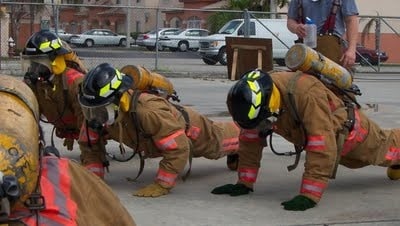
The Recruit Firefighter Academy, What to Expect. You’ve finally made it! It’s time to start your Recruit Fire Academy. You’re preparing for your first day of the firefighter training academy. Or you may be preparing for a public training academy provided by your local college. Either way this is an exciting and scary time.
I get asked often what to expect on that first day as a new recruit firefighter. How can you prepare? How can you excel? What is that typical day in the fire academy like and what can you expect.
I will start off by telling you a typical day will be filled with academics, physical fitness, and fire ground drills. The Fire academy is a relatively short time period, typically 12 to 16 weeks, that is designed to create a line ready firefighter that will perform well on their first day of their career.
I’ve taught in the fire academy, both at our local college and for our career fire training academy for over half of my career. I have seen recruit firefighters excel in their first academy, and I’ve seen others fail miserably. The difference in success and failure is usually very close to the same issues in the fire academy. What is important is to not only what you should do but also what you should not do. Knowing what to expect that first day and first week of your academy will be a great start for success and lowering your stress.
Another good read to help you prepare for your Fire training academy is “9 Reasons Recruit firefighters Fail the fire Academy.”
First day at the Recruit firefighter Academy, What to Expect.
Expect a certain level of chaos and stress for that first day. The first day will set the tone for the rest of the academy. Once the initial introduction and expectations are discussed and covered in detail it will be a day of hitting the ground running.
Expect drills and “events” that will test your ability to work as a team and start to identify leaders within the academy. Many of these drills will seem impossible to complete in the time allowed. The point of these drills is to start bringing the academy together as a team. It will also identify recruits that may not be fit, physically or mentally, for the fire service. The reality is the fire service and being a firefighter is not for everyone.
You may leave this first day asking yourself “what have I gotten into”? Relax and trust that it gets better. The Fire Academy will truly change who you are and make you realize what you can accomplish in your career and in your life. What is important from the first day and throughout to academy is to always apply 100 percent effort, be willing to learn and trust in your instructors.
The Station-Ready Rookie: Firefighter Preparation Beyond the State Skills Test.
While fire academies teach the fundamentals and technical skills of firefighting, “life as a rookie” is an area that is mostly overlooked.
Surviving your first week at the Recruit Fire Academy
You made it! You’ve successfully competed your first week, Congratulations. By now you probably have a feel for the structure of the Fire Academy. Ok, maybe not quite yet.
What is that first week hold for you. First you will learn the chain of command and the structure of the fire service. You will typically be broken out on to specific teams or groups of 4 to 6 fellow recruits. These teams are developed to represent a fire company or crew. You will be expected to drill together workout together, and study together.
You will also have a team leader assigned to your group. This person will be your first level of reporting to in the chain of command. If you have a problem or need bring it to your leader first. He will typically take it up the chain of command.
You will also have a class leader assigned during this first week. This is the next level of command within the Recruit class and will. report daily to the lead instructor to discuss problems, issues or class needs.
The important of the is to develop a strong paramilitary framework for all the new recruits to follow and get accustomed to.
What is important for you, as a new fire recruit, is to do your best to follow, work and learn from this command structure. It’s important for you to show you are a team player, will support your fellow firefighters and follow instructions.
Your schedule for the first few weeks of the academy will have more focus on academics and physical fitness. Drills will be basic skills such as donning your protective firefighting gear and learning daily tasks such as cleaning the classroom, working out and study habits.
The Recruit Fire Academy, first 8 weeks.
The first half of the academy is much like what was described for week one. Academics is the top priority. There will be many tests and a lot of assignments that will require hours of study outside of the academy. Good grades are expected. Just getting by will not get your through the Fire academy. Most academies expect an 80% or higher grade for each test to pass. I can’t stress enough the importance of good study habits that you follow daily. If you have a topic you are struggling with let your team leader know and get help! You cannot afford to fall behind.
You might be asking yourself what you could possibly be studying in such detail and volume. After all you’re “just a firefighter”. I never thought I would continue to train and study as much in my fire service career. This starts in the academy and will progress throughout your career.
Topics you will be studying will be many and vary in importance. Topics will include:
- Fire science, how fires start and burn.
- Fire Service History.
- Building construction and how building burn.
- Water hydraulics.
- Different types of fire suppression products.
- Different types of firefighting tactics and techniques.
- Firefighter survival skills.
- Salvage and overhaul skills.
- Automobile extrication.
- Wild land firefighting
- Incident Command
- Basic emergency Medical skills
- Hazardous Materials response
This list is extensive but far from complete. The International Fire Service Training Association, IFSTA, Essentials handbook is currently up to 27 chapters and over 1400 pages. This handbook will most likely be issued to you on your first day along with you class manual. You will learn this material in its entirety throughout the academy.
The Second 8 weeks of the Recruit Fire Academy.
The second half of the academy will be primarily skills based. You will spend most of the second 8-weeks on the drill ground. Here you will put in to action the basic skills and techniques you have been studying for the first 8 weeks.
These drills will consist of.
- Fire hose line deployment and management
- Protective fire gear donning and use to include Self Contained Breathing apparatus SCBA and bunker gear.
- Salvage and overhaul
- applying incident command
- Search and rescue skills and techniques
- Firefighter survival skills
- Wild land fire response
- Hazardous Materials Response
Again, this list is extensive but far from complete. You will be expected to demonstrate these skills both as an individual and as a team.
The last few weeks of the academy will consist of multi company drills often in live fire conditions. You will receive tasks and assignments as a team and be expected to complete them will little to no guidance from the instructors. You will also complete state evaluated testing to become certified as a level 1 or level 2 firefighter.
Final Thoughts
Your Recruit Fire Academy will be very challenging and will probably cause a lot of stress during the process. There is always going to be a high level of expectations from your instructors that will at times seem difficult to meet. Trust that you will have the skills and the knowledge from your studies and your instructors to be successful.
Study hard, listen to your instructors and you will be successful. Good luck to you and remember that you are starting your journey in one of the greatest careers on earth.

